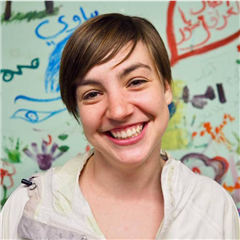2018
Liza Comart ’06
Liza Comart, our 2018 Tikkun Alum honoree, is currently in graduate school at Rutgers University getting her Doctorate in Psychology.
I have found from my experience working with refugees* that seeking asylum is a great equalizer.”
My friend Kasim, a construction worker from Aleppo, is awaiting asylum in the same refugee camp as Abdul, whose last name is well recognized for his family’s wealth and prestige in Syria. Kasim traveled from Syria to Turkey on foot, and then to Greece on a small, motorized raft with 71 other people, several of whom did not survive the trip. Abdul swam from Turkey to Greece at night. It took him seven hours.
The Jewish people are neither strangers to displacement nor to harrowing journeys. From mass exodus from Egypt to the Holocaust, which created the greatest forced displacement the world had ever seen, conflict migration is an experience that generations before us have known well. But we are also a people who take initiative. We have survived as a result of the tenacity of our ancestors and help from those who have been our allies. The Rashi School taught me that whenever possible, we must ourselves be these allies. I learned from a young age that it was a privilege to engage in Tikkun Olam.
At the time that I recieved the Tikkun Alum award, I was living in Lesvos, Greece, where I volunteered full-time at a refugee camp geared toward vulnerable asylum seekers, including families, pregnant women, and people with developmental disabilities, most of whom have extensive histories of trauma. In collaboration with colleagues, I developed a program called Mikros Dounias (meaning “Little World”), which integrates local Greek children with refugee children who reside in the camp. Loosely based on the innovative Forest School model, we built the program in a natural environment fostering creativity and independence. This grassroots organization, still in its infancy, integrates children speaking different mother tongues, most of whom have a remarkable capacity for nonverbal communication. Both Pikpa and Mikros Dounias are funded completely by individual donors, giving us the independence to adapt to the needs of the refugees as the crisis in Greece continues to unfold.
Building these small communities is critical in Lesvos, an island that has received more refugees over the past three years than its entire Greek population. This mass migration has caused many communities to alienate refugees, often defacing their own cities with racial and religious slurs. The Greek families involved in Mikros Dounias have engaged in Tikkun Olam, fighting against the growing stigma towards refugees, by enrolling their children in an integrated educational environment. Our goal is to foster natural alliances, which has been surprisingly simple; three-year-olds do not bare racial prejudices. While xenophobia looms large and thousands of people are trapped on this island, children at Pikpa are unknowingly practicing Tikkun Olam. They do not need to learn tolerance, because they have not yet been taught intolerance.
Rashi taught me that responsible members of the Jewish community are those who ask provocative questions. Promoting skepticism within classes is not afforded at all institutions. But in order to engage in productive Tikkun Olam, we must question our own assumptions; in my case, assumptions about refugees and early education. Being taught to do so has helped me collaborate on an innovative program suited to specific populations, rather than merely following existing models intended for more typical circumstances. I hope to continue Rashi’s legacy, to encourage intellectual freedom in an institution where many children may not remember life before captivity on this island.
*The term refugee technically refers to people who have already gained asylum. The majority of residents at the camp are still seeking asylum and are unable to leave the island legally.
Note: pseudonyms have been given and identifying details have been changed to protect the privacy of individuals.
For more information or to support the refugee camp, Pikpa, please visit www.lesvossolidarity.org/en/
For more information or to support the children’s integration program, Mikros Dounias, please visit en.mikrosdounias.eu/


